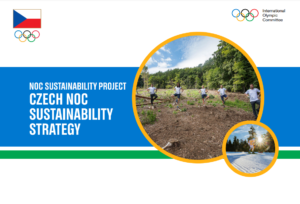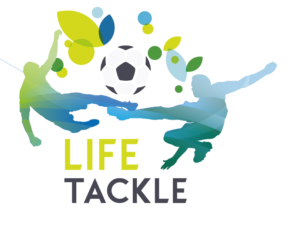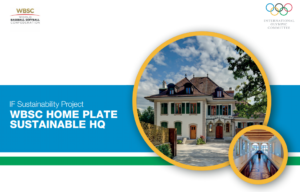
The Czech Olympic Committee (COC) has released its
new Sustainability Strategy as one of the outcomes of its
participation as a mentee in the As Sustainable As Possible
(ASAP) project. The Strategy was inspired by the IOC’s
sustainability guidelines and best practices from the mentor
NOCs: Germany, Finland and Denmark.














LIFE TACKLE is a project co-financed by the European Union aiming at improving the environmental management of football matches and the overall level of awareness and attention towards environmental issues in the football sector, engaging its most relevant stakeholders – National Football Associations (NFAs), Football Clubs, Stadiums managers and Supporters.
Sant'Anna School of Advanced Studies leads this project, and is assisted by a consortium of entities including ACR+ (Belgium), AMU Genova S.p.A (Italy), EURACTIV.COM LTD (UK), the Italian National Football Association (Italy), the Romanian National Football Association (Romania), LIPOR (Portugal) and the Swedish National Football Association (Sweden)




WBSC Home Plate sustainability HQ
The World Baseball Softball Confederation (WBSC) officially opened “Home Plate” on July 2020, its new headquarters in Switzerland, designed with sustainability at its heart. The move follows the merger in 2013 of the International Baseball Federation and the International Softball Federation and the acquisition in 2018 of the building which, after a complete renovation, now hosts its joint federation.
Seeking to leave a positive legacy for its community, sustainability was embedded in every step of the planning, conditioning and intended use of its new headquarters.
Twenty-four roof top photovoltaic panels, with a power output of 12 kilowatts, provide approximately 10% of the building’s electricity needs with the goal of increasing the capacity to cover 100% of its needs by 2025. The underfloor heating and cooling system use hot and cold water to maintain an ideal office climate, whilst all walls have been insulated with high density stone wool allowing temperatures to be maintained for up to 20 hours after the system has been switched off. The same stone wool increases fire resistance and acoustic comfort. All the lighting is made with LED technology and occupancy sensors to keep energy consumption levels to a minimum. The interior Saint-Gobain glass walls and doors feature fire resistant Ei-60 glass - double of the requirement by law.
BENEFITS
- The WBSC now has a sustainable, state-of-the-art permanent headquarters to allow for further, and conscious, growth.
- The new headquarters have significantly improved the working environment and team spirit amongst the staff.
- The sustainability of the building is a source of inspiration to the staff to come up with their own ideas for making their working environment even more sustainable.
Click here to download the case study







The Comité National Olympic et Sportif Français supports the agenda for social responsibility leading to Paris 2024
Over the last 20 years, France has been the host to 55 international competitions, climbing to the podium of the top three countries for hosting major world sporting events. Building on the national expertise, the French Ministry of Sports, World Wide Fund for Nature (WWF) France, and close to 80 organisers of sporting events signed a charter of 15 eco-responsible commitments to achieve the Paris 2024 Olympic and Paralympic Games legacy goals.
As part of their commitment to create tools to help stakeholders carry out the transition into sustainability in sports, the French O National Olympic and Sports committee (CNOSF), with support of the IOC, has launched a dedicated platform to share best practices on sustainable development. The platform for “environmental excellence through sport” or RSO (Social Responsibility of Sports Organisations) is a call for all stakeholders in the sports movement to structure and promote their approach to sustainability.
Click here download the case study









Since the launch of its guidance document – Active Travel Guidance for Sports Stadia – in May 2019, Healthy Stadia has been working with a number of pioneering European clubs and stadia operators on the development of case studies offering further insight into the promotion of walking and cycling to sports stadia. The first of these case studies to be published is from colleagues at KAA Gent, profiling a comprehensive active travel strategy that has been led by their Football in the Community department. Based at the newly built Ghelamco Arena (20,000 capacity), the club has a serious commitment to active travel, and has developed a major mobility programme for supporters over the last three years, promoting: walking, cycling park and ride shuttle busses, regional bus routes for supporters, and, carpool parking spaces near to the stadium. Under the campaign title, ‘Cycling Buffalo’s’, KAA Gent have been able to install 2838 permanent cycle locking stalls, with another 600 mobile stalls, with an average of +15% of KAA Gent supporters coming to the Arena by bicycle – see below to download the full case study. Healthy Stadia will be publishing a second active travel case study that has been developed with Gdansk Letnica Stadium in the December edition of our newsletter, whilst we invite any stadium operators and/or clubs who are interested in showcasing their own work on active travel to contact us for further details on developing a case study.




VfL Wolfsburg has traditionally had very close ties with society and, like traditional business enterprises, bears responsibility towards it (Corporate Social Responsibility, CSR). The association is aware of this responsibility for the effects of its actions on people and the environment and has therefore firmly anchored CSR in its self-image. Nationally and internationally, it wants to be perceived as a responsible player and thus take a leading position in professional football. Sustainability and CSR reporting is a central communication tool for the club. Its most important addressees include fans, employees, partners and sponsors of VfL and Volkswagen AG. It also addresses non-governmental organisations and interest groups as well as representatives of politics, science and research. Here is an overview of sustainability programme VfL Wolfsburg including report (2016) that was published in compliance with the Global Reporting Initiative (GRI) guidelines




Sustainability in professional football, a case study from the Bundesliga (German)
DetailsFootball is the number one sport in Germany. Millions of fans follow the matches every weekend: live in the stadium, in front of the TV or in the summary in the evening. The clubs in the 1st Bundesliga have long since ceased to be sports clubs.Football not only moves people, but also enormous sums of euros. And this is precisely where the present imug study comes in : For a long time now, companies have been called upon to take on corporate social responsibility (CSR). This responsibility must also be faced by football clubs, which have long since ceased to operate as charitable associations and are now generating millions of euros. It is not only about sporting success on the pitch.




E-book, developed by Right Hub, with good practices of the motorsport sector about manufacturing, fundraising, donation, supplying devices of protection and services. This e-book is divided according to the different stakeholders involved: organizers, teams, racers, sponsors, suppliers, partners, racetracks and car and motorcycle companies engaged in racing.




Research: Measuring the environmental sustainability of a major sporting event: a case study of the FA Cup Final (2008)
DetailsThis paper demonstrates how the ‘Ecological Footprint’ has been used to measure the environmental sustainability of the UK’s Football Association (FA) Cup Final. This approach provides valuable insights into the global environmental impacts generated by visitor consumption patterns. The paper also demonstrates how this tool can support policymakers and event organizers in staging sustainable events through the development and assessment of policy scenarios.




The Republic of Sports is an initiative to empower and integrate Lausanne based refugees through sport. A group of local refugees teamed up with local (Swiss) youth to volunteer at the Lausanne 2020 Youth Olympic Games.


